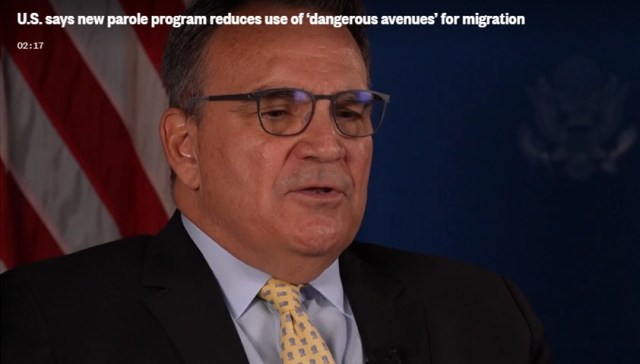
Over 16,000 Cubans have emigrated to the U.S. through a humanitarian parole program since it began in January, U.S. Chargé d’Affaires in Havana, Benjamin Ziff, told NBC News.
By NBC News – and
Apr 21, 2023
The U.S. is making efforts to expand the number of people in organizations who are willing to sponsor immigrants from Cuba and other countries as part of the Biden administration’s parole program, according to the U.S. chargé d’affaires in Havana, Benjamin Ziff.
The parole program was initially rolled out in October 2022 for Venezuelans and extended in January to include Cubans, Nicaraguans and Haitians. Up to 30,000 people from the four countries are eligible for humanitarian parole every month, entitling them to work in the U.S. for two years. Anyone who tries to cross the border illegally is returned to México and denied a chance to seek asylum.
So far, over 16,000 Cubans have emigrated to the U.S. through the program.
One of the conditions to apply for the parole program is to have a sponsor in the United States.
The Cuban, Haitian, Nicaraguan, Venezuelan program that began in January is “innovative in that you don’t have to have family or friends as sponsors,” Ziff said in an interview with NBC News in Havana. “An NGO, a church, any organization can sponsor an immigrant to go to the United States under the program.”
Ziff said the goal of the program is to have “legal, orderly and safe migration.”
In Cuba, some of those seeking to migrate who don’t have close relatives in the U.S. have been victims of scams. Others resort to making the perilous trip on makeshift boats through the Straits of Florida.
“Representatives from the Office of Cuban Affairs at the Department of State and the U.S. Embassy in Havana constantly encourage institutions to sponsor the parole program,” Ziff added in a statement. “We frequently engage with representatives from religious, non-governmental, humanitarian, and other organizations both in the United States and in Cuba.”
The number of those coming by sea has shot up in recent times. Since October, the Coast Guard has interdicted 6,317 Cubans, compared to 6,182 in Fiscal Year 2022 and 838 in 2021.
Cuba maintains that the U.S. Cuban Adjustment Act, a 1962 law, promotes irregular migration by allowing most Cubans who are admitted and given parole in the U.S. to apply for legal residency in the country after a year and a day.
The Biden administration has struggled with record numbers of migrants attempting to cross the U.S.-Mexico border. Over 220,000 Cubans arrived at the U.S.-México border in 2022, more than any year on record.
Illegal border crossings have dropped sharply since the parole program was announced in January.
Cuba has been roiled in an economic crisis fueled by a decline in tourism since the pandemic, tightened U.S. sanctions and a centralized economic model. Shortages in food, medicine and power are rampant. Inflation has caused the price of basic foods to skyrocket and an ongoing gasoline shortage is leading to hourslong queues.
The U.S. and Cuba held a fresh round of migration talks in Washington last week.
“We touched on the various elements of the migration situation, we discussed the role of the U.S. embassy in Havana in issuing visas,” Ziff said.
The U.S. embassy in Havana resumed full immigrant visa processing in January after being closed since 2017, but nonimmigrant visas are still on hold.
“We do not have the status or the facilities that we had a few years ago to be able to supply the nonimmigrant visas,” Ziff said.
He said once they have a normal staff and get through the back log of immigrant visas, they will explore resuming non-immigrant visa services at the embassy.
“We have to increase our staffing here from the United States. At the same time the Cuban government facilitates our logistical needs for houses and staff and visas and other elements that require their help to be able to re-staff the embassy,” said Ziff. “I think the Cuban government is willing to assist us in this important task, and we are looking to get back to normal operations as soon as we possibly can.”
The meetings on migration happen twice a year and a date for the next round of talks has not been set yet.
Ziff also said the U.S. is “looking for a correct and pragmatic relationship with the Cuban government. There is a realm of interests that we share with Cuba, with the Cuban people.”
“We have a very deep disagreement with the Cuban government on its Human Rights policies and its lack of freedoms on the island, but at the same time we have other interests that are important to us, that we will continue to work on, that are relevant to the U.S. interests in the region,” Ziff said.
…
Read More: NBC News – U.S. urges organizations to sponsor immigrants to stem ‘dangerous’ migration
…

